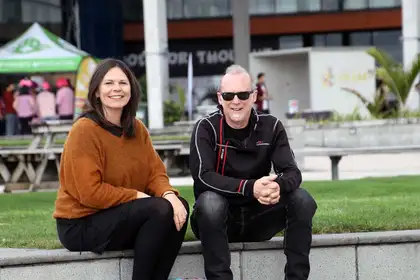
Dr Trudie Cain and Dr Warwick Tie are part of a new programme that injects a sense of hope into the teaching of sociology.
From cyberspaces to sacred spaces, shopping malls to sexual identities – sociology examines the complexities of culture and society, from the status quo to emerging trends. There’s never a shortage of material. But how useful is sociology in an age where humans are facing massive crises?
Let’s face it – the planet is dying, right-wingers and racists are on the rise, robots are taking all the jobs. Have there ever been so many overwhelming global threats?
People tend to default to science and technology for solutions. Yet social scientists also develop deep insights for solving complex problems. Massey sociologists are taking things a step further. They’ve come to appreciate the importance that hope plays in critical analysis – whether of everyday life, a social issue, or a bleak, global scenario.
Their new suite of teaching resources attuned to the challenges of this century will help to enable this generation to re-fashion hope for these times – hope that people can make changes and envisage a better future. In this vein, sociologists have created a set of ground-breaking undergraduate papers – with titles such as: ‘The Stuff of Everyday Life’; ‘Imagining Other Worlds’; ‘Gender: Bodies that Matter’; ‘The Politics of Truth’, 'Social Inequality and Justice' and ‘The Anthropocene: Towards a Politics of Hope’.
Lead sociologist Dr Warwick Tie – who has spearheaded the new programme – says the decision to embed hope into sociology is driven by a sense that we live in highly disruptive, challenging times.
Student input
The desire for a fresh approach also stemmed from conversations with students, past and present. Their input and ideas have helped shape new teaching materials and platforms.
In a new course, sociology students enrolled in the Bachelor of Arts (BA) at Massey are tackling questions like: How might societies adjust quickly to climate change and to the global depletion of biodiversity? What should we listen to or read if we want to know what’s going on in the age of fake news and Trump-style politics? Are smart phones turning us into zombies? Can people in urban-centric lifestyles be connected to nature? What does gender equality mean in an age of diverse and nuanced, yet often invisible, identities and relationships?
“We want students to know what it is to be hopeful, as well as be critical,” says Dr Tie.“We see sociology as the means by which to understand what it now means to live a hopeful life. That includes learning that you can instigate change by learning about and understanding how groups or individuals have done so.”
After all, is there any point in trying to fathom the causes and implications of massive and potentially cataclysmic issues facing humanity unless we also enable new forms of hope attuned to this time, he asks?
Gender politics game-changer
While sociology has traditionally focused on gender, economic inequalities and de-colonisation, his team’s observation is that the “disruption” of gender politics is the game-changer for this generation. There’s also a sense of a “new collectivism” emerging and a move away from the individual as a base framework for assessing societal change.
Thus, new papers take fresh perspective on topics such as the meanings of gender and sexuality, and the politics of truth, as well as offering a hopeful analysis of the Anthropocene and future of the planet, and Utopian alternatives to capitalism, consumerism and quest for endless growth.
Every generation re-writes sociology
“Every generation re-writes sociology depending on the zeitgeist, and the shared preoccupations of the day,” says Dr Tie.
You could hardly get a more sobering focus than the just-released United Nations report on the perils facing the planet from massive human-caused degradation of nature and unprecedented rates of species extinction.
Colleague and sociology lecturer Dr Trudie Cain says that the terrible events of Christchurch on March 15 also heightened what she and her colleagues already sensed was a stronger desire for unity, empathy, and harmony. “Our students are part of the discussion on how we are all implicated and what do we do now,” she says.
Another pivotal issue the new sociology papers tackle is a shift in politics, around the emergence of fake news, big data, and the rise again of the far-right.
What doesn’t change in their programme is sociology’s essential teaching – that there is no one way to understand a thing, person or issue. Take the shopping mall, and the contradictions it induces – shiny material temptation often alluded to as ‘retail therapy’ versus a desire to consume less.
“For some, shopping malls are a perverse pleasure,” says Dr Cain. “But what’s actually going on? You learn so much about everyday life – even the banal – in a fresh light by breaking through assumed views and values. Sociology provides ways for making sense of issues that can feel ‘too big’, without boxing us into set responses.”
Read more to find out about studying sociology.